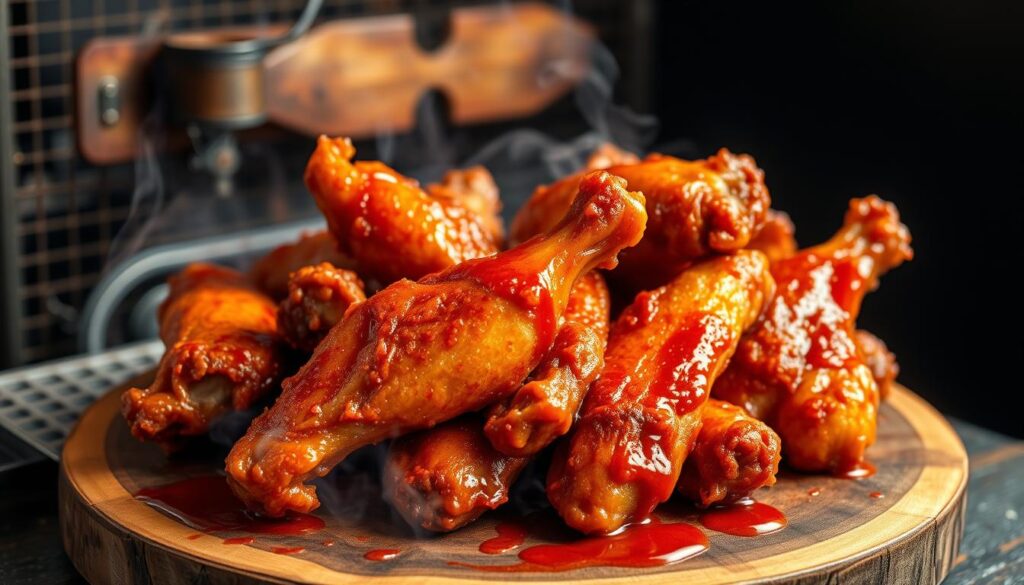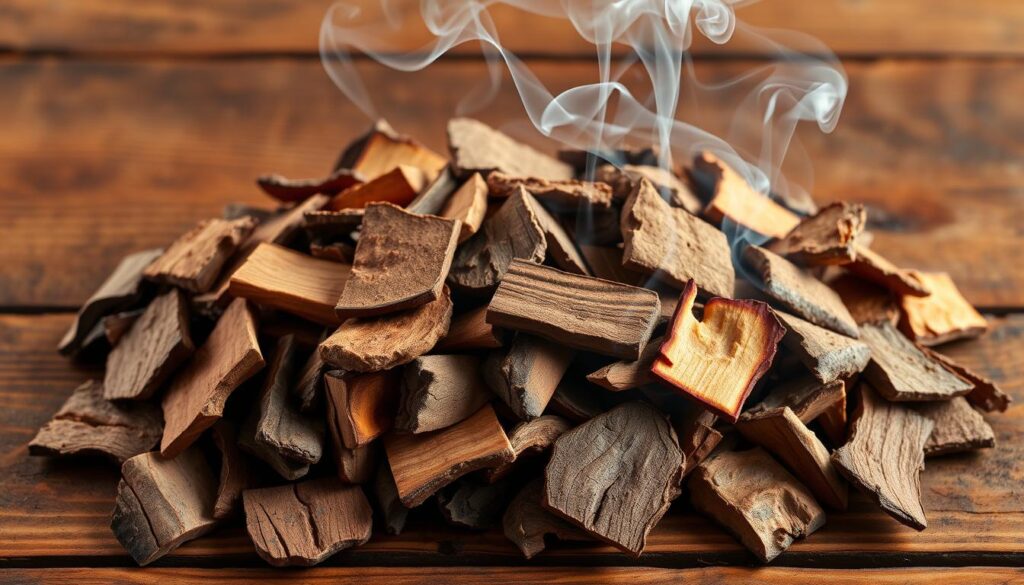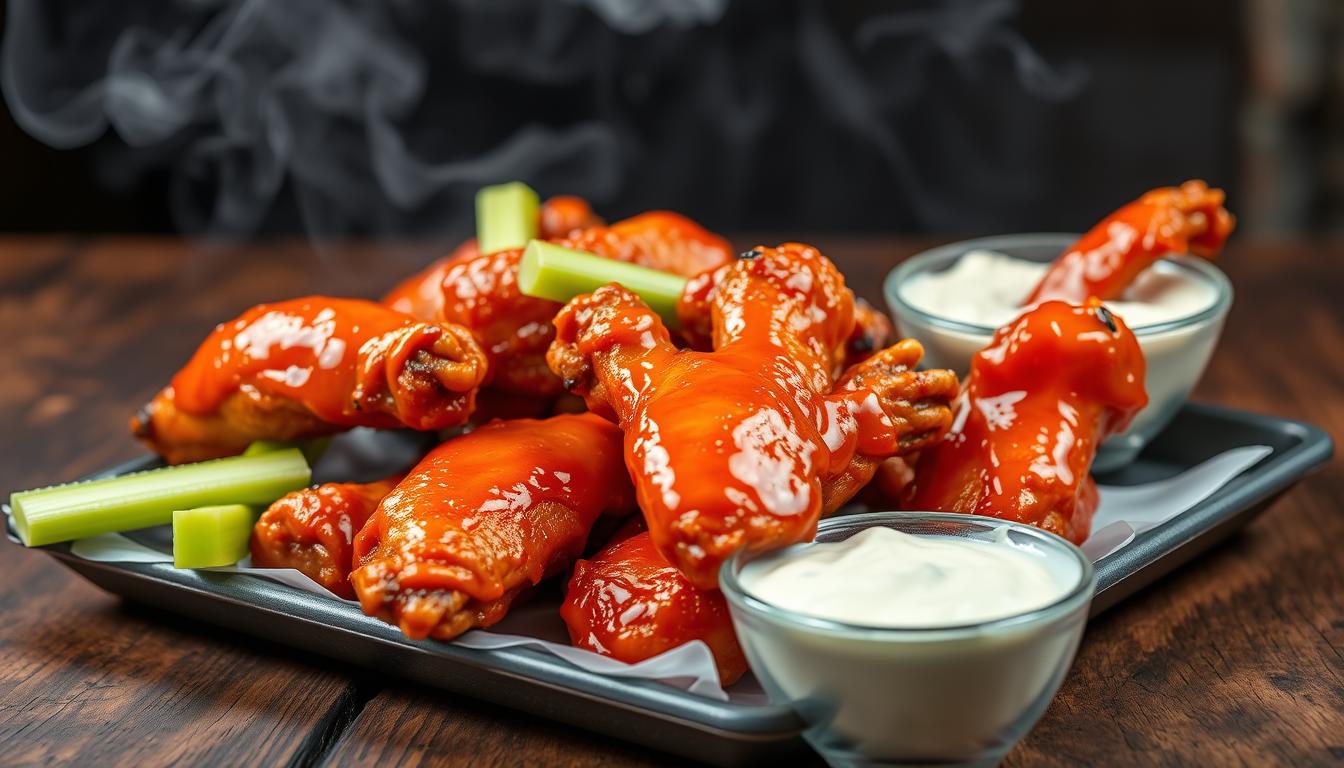The smell of smoky chicken wings can turn a simple meal into a special treat. If you want to make buffalo sauce smoked chicken wings like a pro at home, you’re in the right spot. These smoked wings are more than just food; they’re a journey of flavors. They mix the deep smokiness of wood-fired cooking with the bold taste of buffalo sauce.
Picture serving up wings that are crispy on the outside and juicy inside. They’ve been smoked to perfection and then smothered in a spicy buffalo sauce. These wings are perfect for game day or a family dinner. They’ll make your cooking stand out and impress everyone.
Key Takeaways
- Learn the ultimate technique for creating perfectly crispy smoked wings
- Master a classic buffalo sauce recipe with professional-level flavor
- Discover how to achieve restaurant-quality wings at home
- Understand the importance of proper smoking temperatures and times
- Get tips for ensuring maximum flavor and texture in every bite
Why Smoked Wings Are Better Than Deep-Fried
Smoked wings are a top choice for chicken wing lovers. They have a unique wood-fired taste that makes any wing recipe special. This taste is unlike what you get from deep-fried wings.
Benefits of Wood-Fired Flavor
Wood-fired flavor brings a rich, complex taste to chicken wings. It’s something deep-fried wings can’t offer. This smoky essence makes the meat taste better, making your meal more enjoyable.
- Enhances natural chicken flavors
- Provides a more nuanced taste experience
- Allows for diverse wood chip flavor combinations
Superior Texture and Taste Profile
Smoked wings have a crispy outside and juicy inside. The slow cooking makes each wing perfectly cooked. This texture is better than what deep-fried wings offer.
| Cooking Method | Texture | Flavor Intensity |
|---|---|---|
| Smoked Wings | Crispy outside, tender inside | Rich, complex wood-fired flavor |
| Deep-Fried Wings | Crispy but potentially dry | Basic oil-based taste |
Healthier Cooking Method
Smoked wings are a healthier choice than deep-fried ones. They use little oil, which means fewer calories. This method keeps the wings’ natural flavors and moisture.
“Smoked wings offer a perfect balance of flavor and nutrition, making them a guilt-free indulgence for wing lovers.” – Culinary Expert
Smoking wings takes 1.5 to 3 hours, depending on the smoker’s temperature. This time ensures your wings are not just tasty but also made with care.
Essential Equipment and Ingredients for Buffalo Sauce Smoked Chicken Wings
To make perfect buffalo sauce smoked chicken wings, you need the right tools and ingredients. Whether using a pellet grill or a traditional smoker, getting ready is key. This ensures your wings taste amazing.
- Smoker or pellet grill (Traeger recommended)
- Meat thermometer
- Large mixing bowl
- Saucepan for buffalo sauce
- Tongs
- Aluminum foil
Here’s what you’ll need for your chicken wings and buffalo sauce:
- Fresh chicken wings (full wings or separated flats/drumettes)
- Kosher salt
- Black pepper
- Frank’s RedHot or similar hot sauce
- Unsalted butter
- Garlic powder
“The right tools and fresh ingredients are the foundation of extraordinary smoked chicken wings.”
Pro tip: Choose wood chips that match your flavor preference. Hickory, apple, or cherry wood can add a great smoky flavor to your wings.
Once you’ve gathered all the necessary tools and ingredients, you’re fully prepared to begin. You’ll make delicious buffalo sauce smoked chicken wings that will wow your family and friends.
Preparing Your Wings for Smoking
Learning how to prepare chicken wings is key to making delicious smoked buffalo wings. The right methods can turn simple wings into a dish that wows your guests. It will also make their taste buds dance with joy.
Proper Wing Preparation Techniques
Begin by picking fresh, top-notch chicken wings. Dry the wings well with paper towels. This step is vital to get crispy skin when you smoke them.
- Choose wings with smooth, unblemished skin
- Remove excess moisture with clean paper towels
- Trim any loose fat or unwanted skin
Dry Brining Process
Dry brining is a technique that changes the game for wing seasoning. It boosts flavor and texture. Coat the wings with kosher salt and chill them for 2-8 hours.
“Enhancing your chicken wings with a dry brine method significantly deepens their flavor profile – BBQ Pitmaster
Signature Seasoning Blend Recipe
Make a special seasoning blend to take your smoked wings to the top. This mix adds depth without overpowering the chicken’s natural taste.
| Ingredient | Quantity |
|---|---|
| Kosher Salt | 2 tablespoons |
| Black Pepper | 1 tablespoon |
| Smoked Paprika | 1 teaspoon |
| Onion Powder | 1 teaspoon |
| Garlic Powder | 1 teaspoon |
Thoroughly mix these ingredients and coat your wings well before dry brining. This guarantees that the wings fully absorb all the seasonings. It prepares them for perfectly smoked buffalo wings.
Setting Up Your Smoker for Perfect Wings
Mastering the smoker setup is key for delicious chicken wings. Your pellet grill preparation is vital. It ensures consistent heat and flavor.
- Digital thermometer
- Heat-resistant gloves
- Wood pellets (apple, cherry, or hickory recommended)
- Drip pan
- Aluminum foil
Here are the essential steps for your pellet grill:
- Preheat the smoker to 325°F
- Clean the grill grates well
- Put a drip pan under the cooking area
- Choose your favorite wood pellet flavor
“Achieving flawless smoked wings hinges on meticulously managing the temperature and ensuring heat is uniformly distributed.”
For the best results, use the 0-400 cooking method. Start with a cold grill and slowly raise the temperature to 400°F. This method gives crispy skin and juicy meat inside. Remember to flip and rotate the wings every 30 minutes for even cooking.
Pro tip: Dry your wings well with paper towels. Then, coat them with cornstarch for extra crispiness before smoking.
The Art of Creating Authentic Buffalo Sauce
Making the perfect homemade buffalo sauce is a skill that makes your smoked chicken wings amazing. It’s all about finding the right mix of flavors and using the butter emulsion method.
Buffalo sauce is more than just spicy. It’s about rich flavors that excite your taste buds. Your sauce should have a perfect balance of ingredients.
Classic Buffalo Sauce Components
- Hot sauce (preferably Frank’s RedHot)
- Unsalted butter
- White vinegar
- Worcestershire sauce
- Cayenne pepper
- Garlic powder
Butter Emulsion Technique
The secret to smooth buffalo sauce is the butter emulsion method. Carefully whisk cold, cubed butter into warm sauce off the heat. This keeps the sauce smooth and shiny, perfect for your wings.
Heat Level Customization
| Spice Level | Hot Sauce to Butter Ratio | Flavor Profile |
|---|---|---|
| Mild | 1:3 | Gentle warmth |
| Medium | 1:2 | Balanced heat |
| Hot | 2:1 | Intense spiciness |
| Extreme | 3:1 | Fiery challenge |
“The perfect buffalo sauce is an art form that balances heat, tanginess, and richness.” – BBQ Master Chef
Pro tip: Add a touch of honey to your homemade buffalo sauce. It gives a sweet-spicy twist that will make your smoked chicken wings unforgettable.
Smoking Techniques for Crispy Wing Skin

To get crispy smoked wings, you need to know some special smoking tricks. These tricks turn simple chicken wings into a tasty treat. The key is to understand how heat, timing, and prep work come together for that crispy outside.
For crispy smoked wings, follow a two-step smoking method:
- Start with indirect low-temperature smoking
- Finish with high-heat searing
- Keep an eye on the internal temperature
The best way to smoke wings is at 225-250°F for 45-50 minutes. This first step lets smoke get into the meat and melt fat under the skin.
“Exhibiting both patience and meticulous technique is essential for creating flawlessly crispy smoked wings.” – Professional Pitmaster
After the first smoke, up the heat to 400-425°F. Sear the wings directly at this high temperature. This step makes the skin crispy, taking your smoked wings to the next level.
| Smoking Stage | Temperature | Duration | Goal |
|---|---|---|---|
| Initial Smoking | 225-250°F | 45-50 minutes | Smoke Flavor Infusion |
| Final Crisping | 400-425°F | 15-20 minutes | Crispy Skin Development |
Smoking tip: Drying your wings overnight can make them even crisper. Salt pulls out moisture, making the skin crispier when heated high.
Remember, aim for an internal temperature of 180-185°F with a crispy outside. Your smoked wings will be the hit of any event with these expert techniques.
Temperature Control and Cooking Times
Mastering wing smoking temperature and cooking times is key to making delicious smoked chicken wings. Knowing how to manage heat can turn your wings into something amazing.
Smoking chicken wings needs careful attention to both outside and inside temperatures. It’s important to keep the heat steady and make sure the wings are cooked through.
Optimal Smoking Temperature
For the best-smoked wings, aim for a smoker temperature between 275-325°F. This temperature range helps cook the wings evenly and adds deep flavor. Using applewood chips can also add a smoky taste while keeping the temperature right.
Internal Temperature Guidelines
- Target internal temperature: 165°F (74°C)
- Use a reliable meat thermometer for accuracy
- Ensure you measure the temperature at the wing’s thickest section
- Avoid touching bone when measuring
Time Management Tips for Smoking Wings
Cooking times for smoked wings vary from 1.5 to 2.5 hours, depending on the size and your smoker. A 30-piece batch of wings will take about 2 hours at 275°F.
“Patience is the secret ingredient in perfect smoked wings” – BBQ Pitmaster
Pro tip: After reaching the target internal temperature, try a quick high-heat finish at 500°F for 5-7 minutes. This will make the skin crispy while keeping the meat juicy.
Final Temperature Recommendations
| Wing Stage | Temperature | Cooking Time |
|---|---|---|
| Smoking | 275°F | 1.5-2 hours |
| Crisping | 500°F | 5-7 minutes |
Remember, precise temperature control is the difference between good and great smoked chicken wings!
Saucing Methods for Even Coverage
Mastering buffalo sauce application is an art that turns smoked chicken wings into something amazing. Mastering the appropriate culinary methods can set your dish apart. Each bite will be full of tangy, spicy flavor.
Professional wing masters suggest a few key methods for even sauce coverage:
- Warm the buffalo sauce before applying it to enhance the distribution
- Use a large mixing bowl for thorough coating
- Toss wings gently to prevent skin damage
The classic method is to remove wings from the smoker and toss them in warm buffalo sauce right away. This method makes sure the sauce sticks well when the wings are hot.
“Perfect wing saucing is about balance – enough to flavor, not to drown” – Culinary Wing Expert
For those who want more flavor, try these advanced techniques:
- Pre-sauce method: Brush wings before final smoking
- Post-smoke tossing: Coat wings immediately after removing them from the smoker
- Double-saucing technique: Apply sauce before and after crisping
| Saucing Method | Flavor Intensity | Skin Crispiness |
|---|---|---|
| Pre-sauce | Medium | High |
| Post-smoke Toss | High | Medium |
| Double-sauce | Maximum | Variable |
Pro tip: Always keep your buffalo sauce warm for seamless wing-saucing techniques, ensuring perfect coverage every time.
Best Wood Choices for Wing Smoking
Choosing the right wood for smoking wings can make your chicken wings amazing. The wood’s flavor is key to that smoky taste that makes wings so good.

When picking wood for smoking chicken wings, think about the wood’s intensity and flavor. Each wood adds a special taste that can make your wings even better.
Flavor Profile Combinations
Different woods give different tastes to your smoked wings:
- Apple Wood: Offers a sweet, fruity flavor with a mild intensity
- Hickory Wood: Gives a strong, traditional smoky taste
- Cherry Wood: Provides a balanced, slightly sweet smoke profile
- Maple Wood: Adds a subtle, delicate sweetness
- Pecan Wood: Brings a mild, nutty undertone
Wood Amount Guidelines
Here’s how much wood to use when smoking wings:
- Start with 2-3 cups of wood chips
- Follow the manufacturer’s advice for pellet grills
- Avoid too much wood to prevent overpowering the wing flavor
“The right wood can turn ordinary chicken wings into a smoky masterpiece.” – BBQ Enthuasiast
Pro tip: Try mixing different woods to create your unique flavor. Blend mild and strong woods to make a taste that will wow your guests.
Side Dishes and Serving Suggestions
Make your smoked buffalo wings even better with tasty side dishes. The right buffalo wing accompaniments can turn a simple meal into a special event.
Choose side dishes that match the amazing taste of your wings. Here are 18 great options to excite your taste buds:
- Sweet potato wedges
- Stuffed mini peppers
- Avocado fries
- Crispy onion rings
- Savory fried rice
- Homemade cornbread
- Creamy mac and cheese
- Classic macaroni salad
- Fresh pasta salad
- Zesty potato salad
- Cauliflower salad
- Unique twist fries
- Tangy coleslaw
- Garden Salad
- Grilled corn on the cob
- Colorful vegetable platter
- Oven-roasted vegetables
- Crispy Brussels sprouts
For the best dipping experience, try these classic buffalo wing accompaniments:
- Blue cheese dressing
- Ranch dressing
- Additional buffalo sauce
- Barbecue sauce
| Side Dish Category | Recommended Pairings | Flavor Profile |
|---|---|---|
| Salads | Coleslaw, Garden Salad | Fresh, Crisp |
| Starchy Sides | Mac & Cheese, Sweet Potato Wedges | Creamy, Rich |
| Vegetable Sides | Roasted Vegetables, Brussels Sprouts | Savory, Nutritious |
Pro tip: Mix and match side dishes to create a personalized wing dining experience that will impress your guests!
Remember, the right side dishes can elevate your smoked buffalo wings from a simple meal to a culinary adventure.
Storage and Reheating Guidelines
Keeping your smoked buffalo wings tasty means using the right storage methods. After you’ve enjoyed them, you’ll want to keep the wings as delicious as the first time.
- Cool wings completely before storing
- Use airtight containers for refrigeration
- Maintain refrigeration and use within five days.
- Freeze wings for extended preservation up to 6 months
When reheating smoked wings, it’s important to keep them crispy on the outside and juicy inside. The oven or air fryer is the best way to do this.
“The key to perfect reheated wings is gentle heat and patience.” – Professional Chef
Here are some good ways to reheat smoked wings:
- Oven method: Preheat to 350°F, place wings on a wire rack
- Air fryer technique: Heat at 300°F for 4-5 minutes
- Avoid microwave, which can make wings soggy
| Storage Method | Duration | Best Practice |
|---|---|---|
| Refrigerator | Up to 5 days | Use airtight container |
| Freezer | Up to 6 months | Wrap individually |
Pro tip: Consume leftover wings within 2-3 days for the best flavor and texture.
Conclusion
Making the perfect homemade wing recipe takes passion, practice, and skill. Your journey to perfect buffalo sauce smoked chicken wings is ongoing. It grows with every cooking session.
Understanding wood selection, temperature control, and sauce techniques is key. This way, you can turn simple chicken wings into amazing dishes.
Professional pitmasters, like those at Butcher BBQ, show that great wings start with top ingredients and cooking skills. Tools like Traeger grills and special rubs can make your wings taste like they’re from a restaurant.
Smoking wings is not just cooking; it’s an art that brings people together. Whether it’s for game day, backyard parties, or cozy dinners, your smoked buffalo wings will be the talk of the night. Keep trying new woods, sauce levels, and seasonings to find your unique flavor.
Your journey with perfect buffalo sauce smoked chicken wings is always evolving. See each try as a chance to get better, try new things, and share tasty moments with friends and family.
FAQ
What Temperature Should I Smoke My Buffalo Wings?
How Long Does It Take to Smoke Buffalo Wings?
What Wood Chips Are Best for Smoking Wings?
How Do I Get Crispy Skin on Smoked Wings?
How Long Can I Store Leftover Smoked Buffalo Wings?
Can I Adjust the Spiciness of Buffalo Sauce?
What Are the Best Side Dishes for Smoked Buffalo Wings?
Do I Need a Special Smoker to Make These Wings?
What’s the Best Way to Sauce the Wings?
Are Smoked Wings Healthier Than Deep-Fried Wings?
What did you think of our recipe?
There are no reviews yet. Be the first one to write one.

